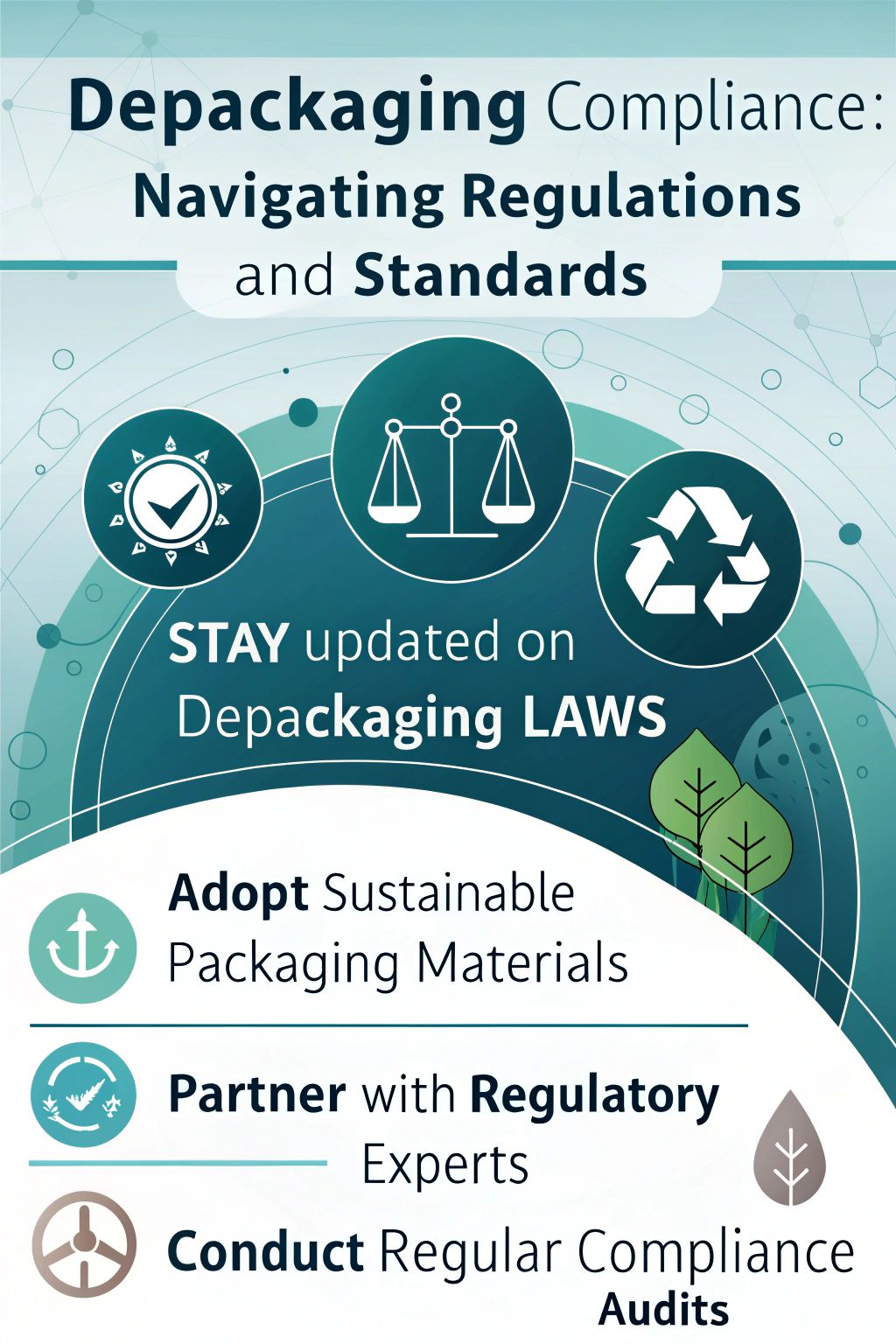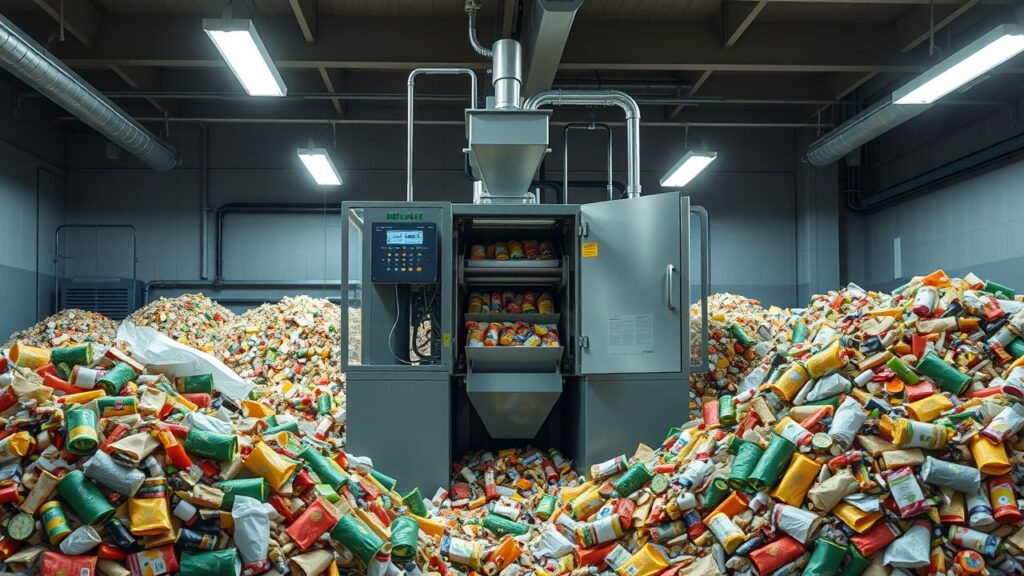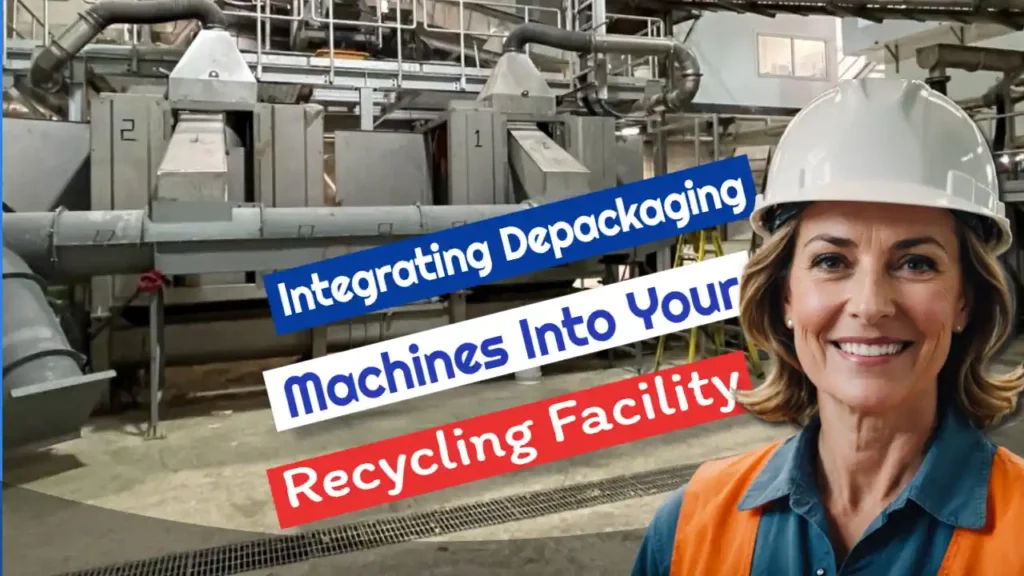Managing waste is tough for many businesses. They struggle to follow rules when unpacking products. Non-compliance can lead to serious problems, such as fines and damage to reputation.
Product packaging serves two important functions. It influences consumer behaviour and keeps goods safe during transport.
This blog aims to help you understand depackaging compliance better. We will explore the main laws and guidelines you need to know. You will learn how to implement best practices in your company.
Stay with us!
Key Takeaways
- Stay Informed on Regulations: Regularly check for updates in depackaging laws. Use compliance software to monitor changes efficiently.
- Implement Sustainable Practices: Use biodegradable and recyclable materials. Minimise packaging waste and avoid banned substances.
- Work with Experts: Collaborate with legal or environmental consultants. They offer guidance on complex regulations and ensure compliance.
- Enhance Consumer Trust: Clear labelling and safe packaging build trust. Following health, safety, and transparency rules reassures buyers.
- Conduct Regular Audits: Frequently assess your company’s practices. Track improvements and identify gaps to mitigate non-compliance risks.

Understanding the Regulatory Landscape

Different regulations shape how businesses handle packaging and waste. Companies must meet rules on health, safety, and accurate labelling of products.
Environmental Regulations
Environmental regulations aim to reduce the environmental impact of packaging. They address waste management, recycling targets, and the use of sustainable materials. For instance, the Packaging Waste Directive mandates a 65% overall recycling rate by 31 December 2025.
Businesses must use more biodegradable materials and lower their carbon footprint.
These rules help protect air quality and safe water. The regulations also minimise hazardous substances like heavy metals in packaging. Companies adhering to these laws show commitment to sustainable business practices and ethical responsibility…
boosting public trust.
Sustainable packaging is not just good for the environment; it’s smart business.
Health and Safety Regulations
Health and safety regulations protect consumer well-being. Packages should be child-resistant. They must use food-safe materials to prevent contamination. Labels need to include allergen and nutrition information.
These rules minimise health risks from products.
Non-compliance can lead to serious issues. Legal consequences are severe, including hefty fines or lawsuits. California Proposition 65 mandates businesses to publish the presence of harmful chemicals in products—this helps people make informed choices for their health and safety.
Companies must prioritise these practices to avoid penalties and maintain trust with consumers.
Labeling and Information Regulations
Clear product information is crucial for consumers. Labels must include ingredient lists and country-of-origin details. The FTC Fair Packaging and Labelling Act mandates specific requirements to protect buyers from deceptive marketing.
Non-compliance can lead to expensive recalls.
EU rules, like the Food Information to Consumers (FIC) Regulation No. 1169/2011, ensure transparency across all member states. These labeling regulations vary by region and industry, so staying informed about local laws is key.
Next: The Importance of Depackaging Compliance
The Importance of Depackaging Compliance
Depackaging compliance is crucial for protecting the environment and public health. It ensures that hazardous materials are handled correctly, reducing pollution risks.
Consumer Trust
Consumer trust hinges on regulatory compliance. Regulatory compliance is key for keeping consumer confidence intact. Trust strengthens brand loyalty and solidifies customer relationships.
Non-compliance can erode this trust swiftly, causing long-term damage to brand image. Following packaging regulations helps build transparency—essential for consumer trust. This adherence reassures consumers that products are safe and reliable.
Brand Reputation
Brand reputation hinges on legal and ethical compliance. Sticking to industry standards is vital. This boosts public perception and brand longevity.
Adhering to consumer protection and data privacy laws is crucial. Ethical practices, like fair labour and environmental responsibility, matter too. “BRCGS certification ensures adherence to safety and quality standards.” These strategies fortify brand integrity…essential for managing reputation effectively.
Legal Consequences
Ignoring packaging regulations can lead to severe outcomes. Fines, sanctions, and legal action are common penalties for non-compliance. Laws like those from the US Federal Trade Commission impose strict standards.
The Food and Drug Administration also enforces rules on labelling and safety.
Non-compliant practices may result in product recalls. This damages consumer trust and public image too. Continuous monitoring of regulatory changes is essential to avoid these risks.
Repeated violations could harm your business’s reputation beyond repair.
Implementing Sustainable Practices in Depackaging
Implementing sustainable practices in depackaging is crucial for businesses today. It helps reduce waste and aligns with environmental standards.
- Use biodegradable packaging:
- Opt for materials that break down naturally.
- Avoid plastics whenever possible.
- Helps comply with the Plastic Packaging Tax.
- Utilise recyclable materials:
- Aim for a high percentage of recycled content.
- California’s law mandates 25% recycled materials or a 45% recycling rate.
- This reduces reliance on virgin resources.
- Adhere to FTC Green Guides:
- Ensure packaging claims are truthful.
- Misleading labels can lead to legal trouble.
- Helps maintain consumer trust.
- Minimise packaging waste:
- Reduce excess packaging elements.
- Implement designs that use less material.
- This lowers disposal costs and waste generation.
- Invest in digital product passports:
- Prepare for future legislation requirements.
- Track material origins and recycling info digitally.
- This supports transparency in the supply chain.
- Avoid banned substances:
- PVC bans are common in many regions now.
- Stay updated on regional restrictions to avoid penalties.
- Ensures safer products for consumers and the environment.
- Encourage extended producer responsibility (EPR):
- Take back used packaging from customers.
- Promote reuse and recycling initiatives.
- Strengthens brand reputation as ethical business practice.
- Use ecolabels on products:
– Indicate eco-friendly attributes clearly to buyers– Align with sustainability reporting standards– Boosts consumer confidence and sales - Conduct regular audits:
– Regularly assess compliance with various regulations– Identify areas needing improvement or updates– Mitigates risks of non-compliance - Collaborate with experts:
– Work with environmental consultants– Stay current on changing laws– Gain insights into best practices
Effective depackaging strategies pave the way toward broader regulatory adherence…https://www.youtube.com/watch?v=SPe3vmjuc1s
Best Practices for Navigating Depackaging Regulations
Keep yourself updated on regulatory changes. Perform regular compliance checks for your company’s depackaging processes.
Stay Informed on Changes
Staying informed on regulatory changes is crucial for maintaining compliance. Legislative updates can happen often and influence your practices significantly. Use technology like compliance software and AI to monitor these changes.
These tools automate the tracking process, making it easier to stay current.
Create a regulatory watchlist for key laws and standards that affect your business. Joining industry associations also helps—providing access to guidance and updates from experts in environmental protection, waste disposal, and sustainability fields.
Conduct regular risk assessments to identify potential issues before they become problems.
Set reminders for legislative updates so you don’t miss any important changes. This proactive approach saves time and reduces the risk of non-compliance.
Conduct Regulatory Assessments
Conduct regular regulatory assessments to ensure packaging compliance. Evaluate your current strategy and practices. Audit your packaging materials for environmental, health, and safety standards.
Maintain detailed records of all compliance activities. This helps with future audits and potential legal issues. Early product testing can catch compliance problems before they become larger issues…
It also sets the stage for sustainable depackaging practices….
Next, let’s look into collaborating with experts in compliance…
Collaborate with Compliance Experts
Depackaging compliance can get complex. Work with legal experts or compliance consultants for guidance. They know the details of environmental and safety laws. Cross-functional teams should include these specialists.
This approach ensures all regulatory requirements are covered, from packaging design to waste prevention.
Ongoing employee training on compliance issues is key. Compliance experts help interpret ambiguous regulations and develop global frameworks. These partnerships improve resource management and reduce risks of non-compliance.
The goal? Protect consumer trust and brand reputation while meeting legislation compliance standards.
Challenges and Solutions in Depackaging Compliance
Ensuring compliance with global standards can be tricky. Collaboration with environmental consultants can help address complex regulations… offering clear pathways to meet these stringent requirements.
Navigating Global Standards
Global standards for depackaging compliance present unique challenges. Regulations differ across regions, complicating efforts for businesses operating internationally. Rapid changes in laws add to this complexity.
For example, GDPR and CCPA impact how companies handle personal data.
Language and cultural differences can lead to misunderstandings and non-compliance risks. Continuous monitoring of regulatory updates is crucial to stay compliant. Training staff regularly helps ensure everyone understands the latest rules.
By staying informed and proactive, businesses can better navigate these global standards—protecting both their reputation and bottom line.
Conclusion
Compliance with depackaging regulations is crucial. It keeps consumers safe and brands trustworthy. It also avoids legal troubles for businesses. Stay informed, work with experts, and follow sustainable practices—your business will thrive in this complex regulatory landscape.
FAQs
1. What is depackaging compliance?
Depackaging compliance involves adhering to regulations and standards related to packaging, ensuring that businesses meet environmental laws and promote sustainable packaging practices.
2. How does depackaging impact the environment?
Proper depackaging helps reduce plastic waste and single-use items, protects water quality, manages food waste efficiently, and supports a circular economy by recycling materials like polyvinyl chloride.
3. Why is it important for construction companies to follow packaging compliance?
Construction firms must comply with these rules to avoid deceptive advertising claims, ensure workplace safety for employees handling materials, and protect the environment from harmful substances like mercury.
4. Can renewable energy sources be integrated into depackaging processes?
Yes! Renewable energy can power biogas plants involved in anaerobic digestion of organic waste from packaged food products—contributing positively towards environmental health.
5. What role do consumer preferences play in sustainable packaging choices?
Consumer preferences drive demand for products labeled as eco-friendly or compliant with truth-in-labeling standards; they also influence business strategy towards adopting more sustainable practices such as reducing plastic bag use.
6. How can businesses navigate complex environmental laws regarding sanitation during depackaging?
Businesses should consult with environmental consulting experts who understand local regulations on sanitation—including those addressing legionella bacteria risks—and implement proper measures to maintain high water management standards while protecting public health against Legionnaires’ disease outbreaks.
References
- https://www.linkedin.com/pulse/uk-environmental-regulations-navigating-compliance-businesses-le9ac
- https://www.worksafe.uk.com/health-and-safety-law/navigating-compliance-a-checklist-for-adhering-to-health-and-safety-regulations/ (2024-02-19)
- https://www.food.gov.uk/business-guidance/packaging-and-labelling
- https://packagingtech.net/blog/navigating-packaging-landscape-regulations-safety-standards-compliance
- https://fastercapital.com/content/Packaging-Regulatory-Compliance–The-Importance-of-Packaging-Compliance-in-the-Business-World.html (2024-06-26)
- https://www.researchgate.net/publication/382565111_Navigating_compliance_and_regulations_in_marketing_analytics_Upholding_ethical_standards_and_consumer_trust
- https://www.linkedin.com/pulse/importance-brand-reputation-compliance-bytescare-aormc
- https://aacustompackaging.com/packaging/packaging-compliance-navigating-regulations-and-standards/ (2024-02-26)
- https://www.paramountglobal.com/uk/knowledge/stay-ahead-packaging-regulations/ (2024-04-18)
- https://ecopliant.com/336273358789-2/?srsltid=AfmBOoqqLExOIl86IT8LL5zbCzvIIpmYP4D_1HJQtJIk-gKYsEcyXM8V
- https://www.iriscarbon.com/staying-ahead-of-regulatory-changes-a-guide-for-businesses/
- https://www.theaccessgroup.com/en-gb/digital-learning/resources/regulatory-compliance-guide/
- https://www.hilarispublisher.com/open-access/navigating-regulatory-challenges-compliance-and-business-sustainability-100507.html
- https://www.robinwaite.com/blog/navigating-regulatory-requirements-triumphing-over-compliance-challenges
- https://www.linkedin.com/pulse/navigating-challenges-ensuring-compliance-global-solutions-bowen
Discover more from IPPTS Depackaging Equipment Insights
Subscribe to get the latest posts sent to your email.








